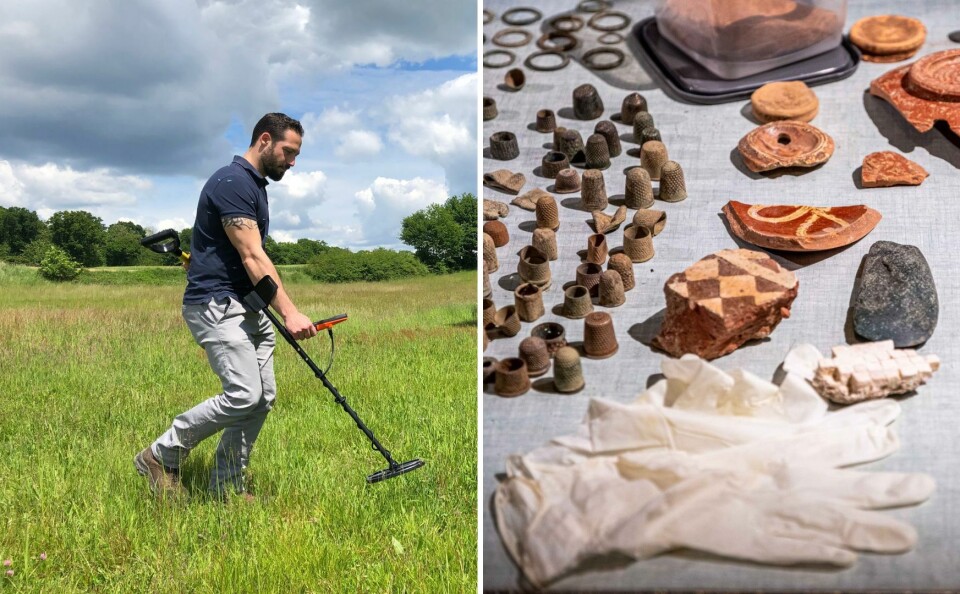-
One of the most notorious meals in the history of French gastronomy
How hard times inspired an outrageous festive feast in 1870
-
Charging non-Europeans more to visit Louvre is discrimination, says major French union
Admission fees set to rise elsewhere in four more of France’s key cultural sites
-
Brouage: inland fortified French village was once a major European salt port
Some 400,000 tourists visit every year - many of whom are Canadian
Metal detectorists in France reject ‘looter’ label in French crackdown
It is illegal to use a metal detector without permission from the prefecture or risk seven years in prison for pillaging heritage

Hobby metal detectorists have had a fractious relationship with the authorities, which regard them as looters of cultural heritage.
Now an exhibition at the Musée d’Histoire de Marseille, called Guilty Treasures and running until November 12, showcases some of the several million items of cultural property – from prehistory to the present day – illegally taken by traffickers and collectors each year.
Read more: French customs seizes 27,000 looted archaeological artefacts
Landowner permission is not enough
While it is legal to own a metal detector in France, if you are caught using one, it could cost up to seven years in prison and €100,000 in fines on charges of pillaging the country’s national heritage.
Nobody can hunt for artefacts without prefectural permission and France is cracking down, not just on the big-time smugglers, but also on the ‘Sunday prospector’.
A spokesperson for the prefecture of l’Ile de France said that only qualified archaeologists will get authorisation to use metal detectors.
“The detection of metallic objects is not a so-called ‘recreation’ and is not protected by any established judicial statute,” they said. Go-ahead from the landowner is not good enough.
‘De facto ban if not an archaeologist’
Retired gendarme and president of the French federation of metal detectorists (FFDM) Major Marc Méreaux told The Connexion: “Prospecting for fun, without any specific goal, is not recognised by the law.”
He estimates there are some 120,000 detectorists in France, although no official statistics exist.
“For the government, there is only one way to use a detector and that is for archaeological detection.
“If you are not an archaeologist, historian or researcher, you will never get authorisation. It is a de facto ban.”
Read more: Bronze Age jewellery discovered intact at prehistoric site in France
10 million objects ‘stolen’ each year
However, Melvyn Derouen, manager of Maison de la Détection in Paris, which sells detection equipment, argues there is some leeway.
“It is the intention that counts, and as long as you are not looking for archaeological artefacts and you have the owner’s permission, you have the right to prospect,” he said.
Xavier Delestre, the Ministry of Culture’s archaeological delegate at the Direction régionale des affaires culturelles (Drac) in Provence-Alpes-Côte-d’Azur, disagrees.
“Around 200,000 people a year are looting our national territory, our collective memory,” he said.
He told AFP that an estimated 10 million objects, at least, are “stolen” every year.
Read more: France returns 26 looted treasures to Benin in historic handover
Potential tough sanctions mean many metal detectorists are too afraid to declare what they dig up.
“We want to be able to declare what we find without fear,” said Mr Derouen.
“They [authorities] must distinguish between an archaeological object and a button.”
‘They are looters’
FFDM’s Major Méreaux draws a comparison with more relaxed laws across the Channel.
“In the UK, since the law was liberalised in 1998, 1.6 million objects have been declared.
“Imagine how many objects have been found in France since 1998 and were not declared.
“Imagine the loss to our heritage,” he said.
In 2020, the Ministry of Culture signed a deal to train gendarmes on how to crack down on prospectors.
Drac’s Mr Delestre does not hesitate to put ‘hobby prospectors’ in the same category as criminal ‘delinquency’ that can sometimes be linked to arms and drugs traffickers.
Alexandre Dumont Castells, a gendarme with a doctorate in archaeology, told AFP: “They can be considered looters because they have no authorisation from the prefecture to look for archaeological objects.”
For Major Méreaux, however, the law needs to allow for more nuance.
“When you see them put a father and his child having fun with a metal detector on the same level as the pillaging of Palmyra, where are we heading?” he asked.
‘People prospect for fun, not to earn a living’
In recent months, there has been more coverage of the issue in French media, which Mr Derouen fears is a sign that authorities are looking to crack down harder on detectorists.
A France TV report included a contribution from archaeologist Jean-David Desforges, a member of the Halte au Pillage du Patrimoine Archéologique et Historique organisation, which has been leading the fight against ‘Sunday prospectors’.
He claimed detectorists were offering their finds for sale online “for €1”.
He also raised concerns that the objects were being damaged by inexperienced cleaning, and that the historic context of the sites where they were found was being destroyed.
For Mr Derouen, the current situation could be improved by better communication and a clearer distinction between farmers’ fields, where most detectorists look, and genuine archaeological sites.
“There is currently no dialogue between archaeologists and prospectors,” he said.
“We want to change this. People prospect for fun, not to earn a living. They have no ulterior motives.”
Related articles
French man finds bracelet of American WWII soldier in a field
Climate change threatens ancient drawings inside French cave
























